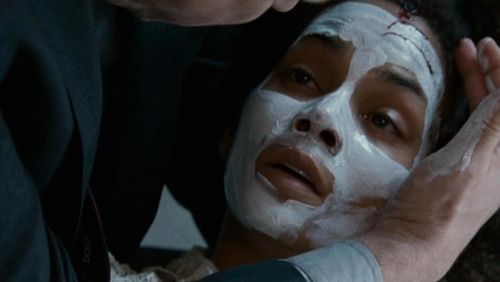Reviews
Movie review: “Frankie & Alice”

Frankie & Alice
dir. Geoffrey Sax
Release Date: Apr 04, 14
- 1
- 2
- 3
- 4
- 5
- 6
- 7
- 8
- 9
- 10
For all the (often deserved) guff that Halle Berry has been given in the past decade since her Academy Award for Monster’s Ball, Frankie & Alice proves that she had at least one more standout performance up her sleeve before falling into the Catwoman-shaped void from which she’s never quite emerged in the years since. As Frankie, a stripper in Los Angeles circa 1973, Berry offers an often affecting portrait of a woman struggling to live with multiple personality disorder, aggressively self-medicating with pot and alcohol but still occasionally losing control of exactly who’s talking through her mouth. And in a film that’s regrettably far more interested in the histrionic explosions that come with such a disorder than a portrait of the human being suffering from it, Berry is at points able to find Frankie’s soul.
Originally filmed in 2008 and put into limited release in late 2010, Frankie & Alice is one of those festival movies you see far too often, the sort that assembles an above-average cast for a by-the-numbers melodrama likely to disappear into the releasing ether. There’s not a lot of surprise in director Geoffrey Sax’s approach to the material, whether visually or narratively. After an unpleasant episode in which a late-night hookup ends in Frankie going into a heavily accented screaming fit and passing out in the middle of the street, she’s admitted to a mental hospital, where she meets Dr. Oz (Stellan Skarsgard), an unorthodox research doctor who takes on Frankie’s case after bearing witness to one of her personality switches.
Here’s where the film firmly establishes itself as a venue for Acting (pronounced ACH-ting). Frankie’s mind is home to two personalities beside her own: Genius, a 7-year-old wunderkind who serves as Frankie’s meek, frightened moral compass against Alice, a racist Southern white woman. And Berry performs all three characters with gusto in a film that too often devolves into long scenes that exist solely to marvel at Berry’s ability to portray these characters. It’s not that she’s bad; for such a borderline-parodic Oscar movie premise, she finds the vulnerable core of all three characters that connects them, and it’s a far more poignant approach to the film’s larger themes of repressed memories and emotional scarring than the film itself takes. To this end, there are lots of flashbacks with grainy visual filters alluding to an incident that, once revealed, is appropriately tragic but lacks some larger impact.
This is largely due to the film’s insistence that Berry convey a sense of tragedy through her meltdowns. For such a committed performance, Frankie & Alice never really seems to understand Frankie, or at least that these outbursts are a manifestation of real, tangible, era-specific pain and deceit and not just a fertile breeding ground for demo reel moments. And Skarsgard, as her foil, pretty much exists in the film just to be empathetic to or harassed by Berry’s alternate personae while loosely alluding to a divorce that doesn’t matter much but gives him the barest possible vestiges of backstory. The film feels out of sync with its subject matter, to such a point where the focus is woefully misplaced. This isn’t a story of an incorrigible madwoman who brings street smarts and inspiring sass to even the bleakest places, it’s one of a broken girl betrayed by virtually every person she’s ever met. And had Frankie & Alice landed there, it may have found the better film within the mediocre one.